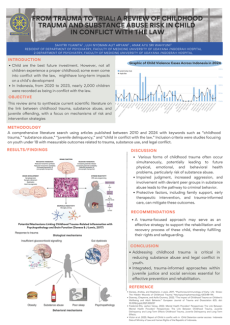Community-based treatment, care, and supervision for people with substance use problems who are involved with the justice system.
Reduce Drug Related Crime
From Trauma to Trial: A Review of Childhood Trauma and Substance Abuse Risk in Child in Conflict with the Law
Introduction. Child in conflict with the law often present with complex psychosocial backgrounds, prominently featuring histories of childhood trauma. Emerging evidence suggests a strong correlation between early traumatic experiences and...

Drug Treatment Courts: An Evidence-Based Review with Recommendations for Improvement
This policy brief by the Canadian Centre on Substance Use and Addiction critically evaluates the role and effectiveness of Drug Treatment Courts (DTCs) in Canada. DTCs are intended to divert individuals with substance use disorders (SUDs)...
NIJ’s Courts Research: Examining Alternatives to Incarceration for Veterans and Other Policy Innovation
This article presents key studies from the National Institute of Justice’s (NIJ) Courts Research Portfolio that examine pretrial, prosecution, and sentencing policies promoting alternatives to incarceration, such as Veterans Treatment...
Annotated Bibliography
This document highlights resources to support your work in reducing drug related crime.
Exploring the Impact of Technical Violations on Probation Revocations in the Context of Drug Court
ABSTRACT Prior research indicates a large number of drug court participants commit technical violations, subsequently increasing the likelihood of revocation. However, there is limited research investigating the potential heterogeneous...
Effects of medication-assisted treatment on mortality among opioids users: a systematic review and meta-analysis
ABSTRACT Opioid use disorder (OUD) is associated with a high risk of premature death. Medication-assisted treatment (MAT) is the primary treatment for opioid dependence. We comprehensively assessed the effects of different MAT-related...
Probation clients’ barriers to access and use of opioid use disorder medications
ABSTRACT Background There is a gap between evidence-based treatment with medications for opioid use disorders (OUDs) and current practices of probation departments who supervise individuals with OUDs. Many probationers with OUDs cannot...
Substance use profile, treatment compliance, treatment outcomes and related factors in probation: a retrospective file review
Abstract Objective In this study, we aimed to investigate the sociodemographic characteristics of the individuals who mandated to the probation unit as the substances they use, their compliance with the programs, treatment outcomes and the...
Substance use treatment services utilization and outcomes among probationers in drug courts compared to a matched cohort of probationers in traditional courts
Abstract Background and objectives: Drug courts provide an array of substance use treatments and community-based services for probationers struggling with substance use disorders. We assessed substance use treatment services utilization and...
Effectiveness of a computerized motivational intervention on treatment initiation and substance use: Results from a randomized trial
Highlights Motivational computer intervention (MAPIT) increased treatment initiation at 2-month follow-up. The significance of MAPIT diminished by the 6-month follow-up. Motivational interviewing (MI) was not significant in any model. No...
